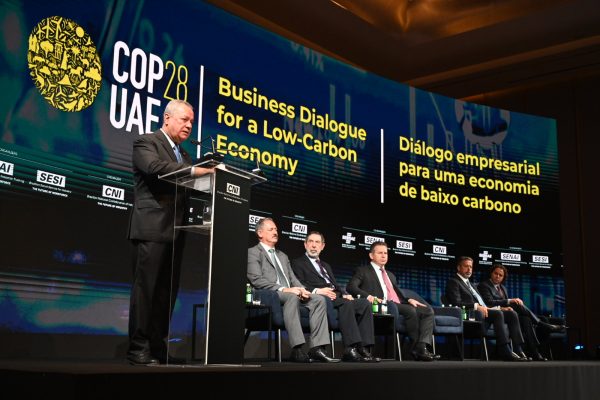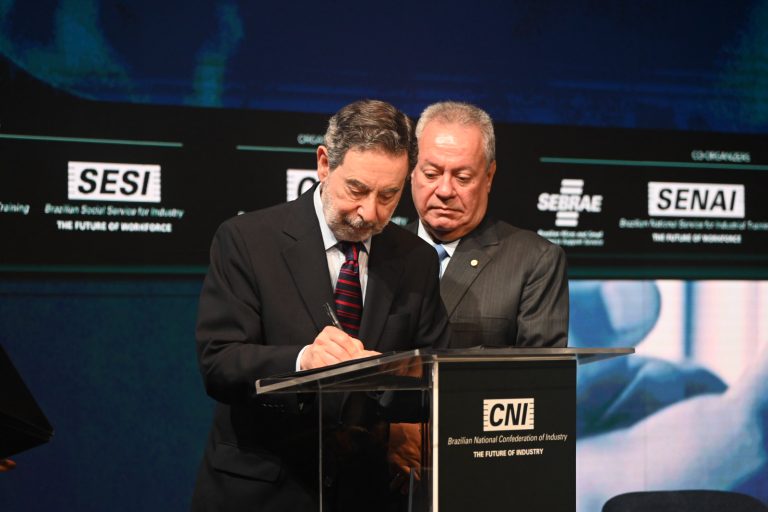Dubai – “Never in the history of this country has there been so much talk about industry decarbonization and sustainability. If there is any sector fully committed to sustainability, it is industry,” said the president of the Brazilian National Confederation of Industry (CNI), Ricardo Alban, this Wednesday (6) in Dubai.
Alban spoke at the Business Dialogue for a Low Carbon Economy in Dubai, an event held by the CNI parallel to the United Nations Conference on Climate Change (COP28). The Arab-Brazilian Chamber of Commerce (ABCC) supported the initiative and signed a Memorandum of Understanding (MoU) with the confederation (pictured above).
In the Atlantis The Royal Hotel conference room, Alban said it is necessary to join forces between the private and public sectors to jointly drive the movement he called “the neo-industrialization of the country.”

“The Brazilian industry sector has unique conditions to be a world leader in low carbon emissions and sustainability. With a more innovative, dynamic, and competitive manufacturing sector, Brazil could grow vigorously and sustainably, generating the income and jobs necessary to improve the population’s standard of living,” said Alban.
For the CNI president, the time to take action is now. “We believe it is possible to combine economic growth with environmental conservation. Together, we can build a more prosperous and sustainable future, which offers better living conditions for everyone,” concluded Alban.
Participating in the opening of the event, in addition to Alban, were the president of the ABCC, Osmar Chohfi; the ambassador of Brazil to the United Arab Emirates, Sidney Romero; the president of the Brazilian Chamber of Deputies, Arthur Lira; the governor of Mato Grosso, Mauro Mendes; and the vice-president of the Brazilian Federal Senate, Veneziano Vital do Rêgo. Other Brazilian members of Congress and authorities were also at the event, such as the president of the Brazilian Trade and Investment Promotion Agency (ApexBrasil), Jorge Viana, and Brazilian and foreign businesspeople.
Lira declared that Congress has been dedicated to the green agenda, especially this last semester, and said that the house is committed to regulating the carbon market and accelerating the energy transition program by regulating the green hydrogen framework and offshore wind energy.
He said Brazil has the conditions and capacity to be a global player in the carbon market and defended broad discussion with all sectors before deciding to vote to build the best proposal.
ABCC president ambassador Osmar Chohfi recalled that since Rio92, Brazil has played a relevant role in the debate on environmental preservation and this is a crucial moment for mobilization to contain global warming. “Brazil and the Arab countries are ideal partners for developing a robust carbon credit industry and market,” said Chohfi.
MoUs for COP30
At the event, the CNI signed four MoUs with the ABCC, US Chamber, Amcham, and First Abu Dhabi Bank. They are aimed at cooperation between the entities in an institutional agenda for COP30, to take place in Belém, in the Brazilian Amazonian state of Pará, in 2025.
The MoU with the ABCC, signed by Chohfi, seeks to develop a positive agenda between Brazil and the Arab countries aimed at a low-carbon economy. “We signed an MoU to build a more consistent and productive participation by the industry sector at COP30, identifying opportunities and partnerships,” said Chohfi.
Brazil’s ambassador to the UAE, Sidney Leon Romeiro, took office in August this year and recalled that Brazil has the largest delegation at COP28, with great engagement from the private sector in the energy transition. “Brazil and the UAE are experiencing their best moment in bilateral relations,” he said. He reaffirmed that the UAE is one of Brazil’s major trade partners and has been striving to diversify the economy, investing increasingly in renewable energy and developing technology aimed at sustainability.
Translated by Elúsio Brasileiro




